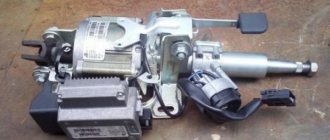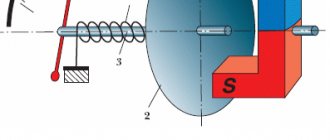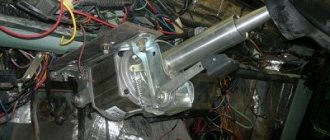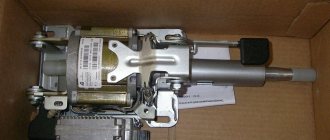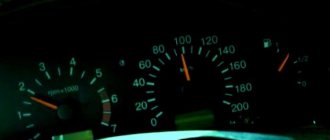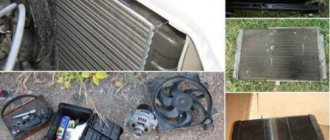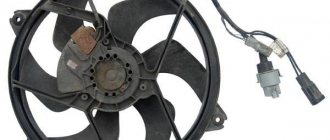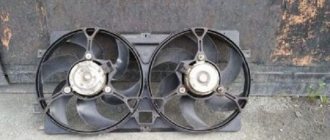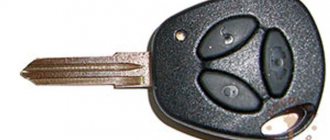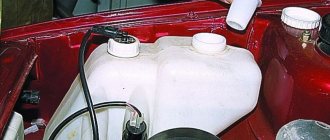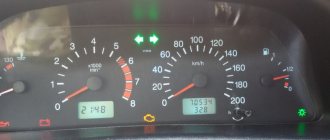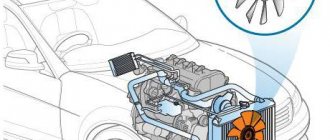Battery problems
Based on this, we can draw the first conclusions about the cause of the breakdown. A common cause of malfunction is low voltage in the on-board network. The fact is that for the amplifier to function, a supply voltage of 13.5V is required.
First of all, we test the battery, if everything is fine with it, then we’ll look into it further. The problem may have occurred when you removed the battery for charging. To make the electric booster work again, turn the wheels to the extreme position and back 5-6 times, very often this is enough to resume operation.
Possible malfunctions of the EUR on the Lada Grante Liftback (Sedan)
| Malfunction | Diagnosis | Elimination method |
| The diode on the side pillar glows due to a faulty speed sensor. | Checking the serviceability of the speed sensor by dismantling it and ringing it with a multimeter. | Replacement of the sensor with a new one, since the design is not subject to repair (partial, complete). |
| Low voltage in electrical wiring. | Checking the integrity of the insulating layer and contact terminals. | Replacement of damaged cable sections, insulation of connection points. |
| The electric amplifier rotates slowly. | Checking the voltage supply to the input contacts from the relay regulator. | Replacing the relay regulator. |
| During rotation, a characteristic creaking, metallic grinding sound is heard. | Dismantling the EUR, disassembling it into its component elements, checking the condition of the rolling bearings. | Replacement of two rolling bearings with new ones. |
Wiring fault
In the case when the battery is in order, we look at the wiring; weather conditions, frost, rain or heat may be associated factors. If the electric power steering on a Priora turns off when weather conditions change, then this is a clear sign of a wiring fault. Check the soldering and insulation of the winding; a short circuit may occur.
The Priora's electric power steering does not work all the time. The maximum load on the electric motor occurs at low or no speed, and the minimum at high speed. So, in the Priora, at a speed of 110 km/h, the electric booster is completely turned off. At the same time, feedback to the steering wheel becomes maximum. The Kalina electric power steering switches off already at 60 km/h.
What does Kalina's power steering consist of?
This unit is an independent device included in the steering mechanism of the Lada Kalina. It allows the driver to turn the steering wheel without much effort, and also ensures softness and smooth operation of the moving parts of the steering system.
Structurally, this mechanism cannot be classified as complex units. The electric power steering has the following parts:
- electric motor;
- gear unit;
- control module;
- sensors that monitor the torque, speed and number of revolutions made by the crankshaft.
The Lada Kalina on-board controller continuously monitors the functioning of this amplifier and controls its operation, but malfunctions do occur and many car owners are very interested in how to eliminate them. The mechanism is activated at engine speeds of 400 rpm. When the speed exceeds 60 km per hour, the electric booster stops functioning. This is done for the sake of safety, because at high speeds the driver must have confident feedback on the steering wheel, which a “light” steering wheel is not able to provide. With increasing speed, a gradual decrease in the magnitude of the force in the mechanism is observed.
Chip errors
When a situation is observed that the wheels turn on their own, the reason is the electronic filling of the Priora electric power steering control unit. As mentioned above, quality was sacrificed for the sake of economy. Now the situation with this seems to have improved and everything has been finalized, but if suddenly you feel that the steering wheel is starting to move by itself, go for repairs.
If, along with the electric power steering, the speedometer also fails, then you need to look at the speed sensor. It was either simply dirty or broken. The same applies to the torque sensor installed on the amplifier. Clean them well and check their functionality.
Don’t forget to reset errors on the on-board computer; this can be done in several ways.
- Remove the terminal from the battery, wait a few seconds and put it back, the error should go away.
- Using a computer, the corresponding software can be found on the Internet.
Electric power steering does not work on Kalina
Good evening! The EUR on the viburnum stopped working, I looked all over the car, I just can’t find the reason. It all started a couple of days ago when I was driving home from work. Suddenly the steering wheel became heavy and I could barely turn it to avoid an accident. Now this has begun to happen much more often, I’m already used to it. I want to understand what the problem is and fix it myself. Help with advice! Thanks in advance!
If the speedometer does not work, then the power steering will turn off!
I didn’t have a speed sensor at all for 1 year, it was a pain in the ass and I installed it and everything works as it should
It happened to me! It turns out that the power steering fuse has oxidized. It's under the hood in a black box next to the battery
I had this happen on my Nissan March, the contact was lost on the wire that went to the positive terminal. I tightened it up and there was no more glitch.
And my contacts on the speed sensor have oxidized, it’s unclear how water got there, and here you go...
With abs car? If so, the speed sensor can be driven into the gearbox. If the sensor is in order, the tracks on the board may burn out in the controller itself. Mainly these reasons.
This happened to me when the battery was dead
There is a bad contact somewhere, check the fuse or relay, check the electrical connection in the EUR
Maybe the speed sensor, or maybe the EUR itself. You can check it with a scanner, or you can check it in the field with a paper clip
It seems to cut off and so on over 60 km/h
I’ll tell you a secret, it doesn’t turn off above 40 or above 60 or even 100. It simply reduces the effort, so to speak.
Take the speed sensor out of the box and look for any chips on it. If there is, clean it and install it back, the problem should go away. At least it helped me
Another option is to solder the optocouplers, it will help, it has been verified. I personally treated several, and I also helped with advice to someone who helped, about 27 people already. You can handle it in an hour without knowing. Bad contact in the sensors, due to the metal on the legs, solder with flux or rosin. soon it won’t work at all, only soldering. If the speedometer works normally, the needle doesn’t jump, then the problem is definitely in them.
The purpose of electric power steering is to reduce the effort exerted by the driver when turning. The EUR includes a control unit and sensors: the system calculates the operation of the amplifier in the “context” of a specific torque and speed. It is clear that the failure of any element of the system negatively affects the ease of driving the car.
Fuse box location
If you suspect that a fuse has blown and you want to check it, then the question arises: where is the Priora electric power steering fuse located? The control mounting block is located to the left of the steering wheel. Its opening scheme is simple. All you need to do is turn the three latches 90˚ and remove the cover, as shown in the photo, and you get to the brain stuffing of the car.
Here you can check and replace the failed fuse, then close the lid by pressing it tightly and snapping the three latches back 90˚ in the opposite direction.
You can carry out diagnostics and minor repairs to the Priora's electric power steering with your own hands. To do this, it is enough to determine what caused the failure and fix the problem, following our advice. It is better to entrust a complete replacement of the electric amplifier to professionals.
Electric power steering is a component used to provide more comfortable driving. Not so long ago, domestically produced cars began to be equipped with EUR, in particular, in this article we will talk about Lada Kalinas. What malfunctions can occur with the Kalina EUR and what troubleshooting methods are there? Find answers to these and other questions below.
Causes of EUR failure
Dismantling and disassembling the electric amplifier
How to tighten the electric power steering rack?
Photo gallery “Adjusting the steering rack”
How can I lubricate and adjust the EUR?
Electric power steering connection diagram with icons
Video “Guide to repairing an electric booster in a garage”
Comments and Reviews
EUR malfunctions and subsequent device diagnostics
As mentioned above, installing electric power steering on Kalina involves using a device that is quite simple in design. Accordingly, repairing a unit and identifying faults in general is not a particularly complicated procedure. But it should be noted that the EUR connection diagram itself, namely the location of the node, was not particularly well chosen by the manufacturer. This is because the EUR is installed under the heater radiator. So when using a car in the winter season, the unit will be affected by different temperatures, in particular, their differences.
This is what largely influences the breakdown of the unit and, as practice shows, in fact this happens quite often. Failure of the electric power steering is associated with problems in the operation of the vehicle and the appearance of various malfunctions.
As a rule, mechanism failure is caused by:
- lack of impulse from the speed controller;
- failure of the system control unit;
- the voltage in the vehicle’s on-board network is too low;
- the permissible unit speed threshold has been exceeded.
At the bottom right there is an indicator in the form of a steering wheel with an exclamation mark - it indicates a malfunction of the EUR
These factors, as practice shows, contribute to mechanism failure. As for diagnostics, it is carried out by the Kalina control unit independently during the startup of the unit and analysis of the serviceability of all systems. If any of the components does not transmit the corresponding signal, the control unit automatically adds it to the list of inoperative devices. The relevant information can be seen on the control panel. In particular, if we are talking about the failure of the EUR, then an orange indicator in the shape of a steering wheel with an exclamation mark will appear on the tidy.
In accordance with the service instruction manual, the manufacturer claims that the problem of the unit malfunction should be resolved in the near future. Therefore, the car owner needs to drive at a reduced speed to the nearest maintenance and repair station. But this is all official data; in fact, things are somewhat different.
As a rule, the appearance of an indicator on the control panel does not imply the need for repair; usually its appearance indicates a malfunction in the operation of the unit. This could be either a malfunction in the power supply circuits or a breakdown of one of the controllers. As practice shows, in most cases the appearance of a light bulb on the panel does not affect the functioning of the unit as a whole (the author of the video is the CompsMaster channel).
In fact, the problem is considered to be a breakdown in which the steering sensitivity is too low. Malfunctions of this kind usually appear quite often and, as a rule, they need to be resolved immediately. Otherwise, ignoring the problem can lead to dire consequences. To quickly solve the problem, you first need to remove the fuse located to the left of the steering wheel. Thanks to this, you can get to the nearest service station for repairs.
VAZ employees claim that the EUR cannot be repaired. If it breaks, it should be replaced!
Causes of EUR failure
Why does the electric power steering on the Lada Kalina not work, turns off and refuses to work, what are the signs of a steering wheel with power steering knocking, jamming, biting or squeaking? To repair the system yourself, you need to know how diagnostics are carried out and what causes precede the breakdown. Most often, the failure of the amplifier is caused by a breakdown of the unit itself and the amplifier fails. Problems of this type are resolved by thoroughly checking the system to identify the exact problem.
As practice shows, often the inoperability of the electric amplifier (failure) is associated with a breakdown of the speed controller.
- the steering wheel is jammed,
- jams
- becomes tight
- and others
Because the speed controller sensor ensures activation and deactivation of the electric power steering under different driving modes. The amplifier on Kalina works if the car is moving at low speed. When the speed begins to increase, the booster automatically turns off, allowing for safer machine control when driving at high speeds.
So, briefly about the reasons for the inoperability of the EUR:
- The speed controller has failed or the control unit does not receive or disappears a signal from it. In this case, the reason may lie in either a breakdown of the sensor, damaged wiring, or poor contact of the controller with the on-board network.
- The voltage in the vehicle's electrical network has decreased. The reasons can be different, ranging from a dead battery and an inoperative generator to the use of inappropriate electrical equipment in the car.
- The permissible crankshaft speed has been exceeded.
- Incorrect operation or failure of the control module. Depending on the cause, the control unit may need to be repaired; more detailed diagnostics need to be done.
Reasons for shutdown
The main reason lies in the electric power steering. When ignited, the system performs a self-diagnosis and if the mechanism does not pass it, a signal is turned on indicating a malfunction. The color of the signal indicates the degree of danger. The light turns red, the problem needs to be fixed urgently. If the color is yellow, the vehicle can be operated, but safety precautions should be taken. There may be several reasons why the electric power steering on Kalina does not work:
- speed sensor malfunction;
- torque sensor malfunction;
- speed exceeds 60 km/h;
- engine speed is less than 400 per minute;
- failure in the control unit;
- poorly soldered contacts;
- insufficient tension.
Software shutdown
- The electric power steering on Kalina turns off after 60 km/h. Therefore, keep this point in mind; it is set in the system unit and is not a breakdown. The Priora's electric power steering is switched off at a speed of 110 km/h.
- Also, the EUR does not work at low engine speeds. If the value is less than 400 rpm, it is not active.
This is software planned inactivity. It is needed to give information to the steering wheel at high speed and reduce wear of the mechanism.
Electrical booster malfunctions
In the event that it is impossible to immediately check the cause of failure of the electric power steering on Kalina, you need to remove the fuse from the block. This is necessary to prevent sudden activation of the mechanism, which leads to emergency situations.
A direct indicator of a malfunction of the speed sensor in Kalina's electric power steering is a non-working speedometer, as well as a lit-up exclamation mark on the dashboard. It may not work for several reasons. Check the appearance of the sensor; if it is covered with dirt, simply clean it. See if any metal shavings have become magnetized and remove those as well.
If this does not help, then the sensor is probably faulty. Such sensors are now inexpensive and can be found in many auto parts stores. We do the same for the torque sensor. But where is the speed sensor? It is usually located in the gearbox housing, see photo on the left.
Another cause of malfunction of Kalina’s electric power steering is the generator. The control unit requires a voltage of 13.6 V to operate; if you have less, change the voltage regulator (chocolate) on it.
Also, the contacts could simply become disconnected due to poor-quality soldering. You can either disassemble and solder the contacts or send it to service.
If the problem is in the control unit, it is difficult to solve this problem yourself; the service will either solder it or you will have to buy a new one.
Diagnostics
To check the amplifier in a car, you need to remove the plastic trim on the steering column; to do this, unscrew the bolts securing it from the bottom.
Then you will need to get to the 8-pin plug, its pinout is as follows:
- The blue contact is connected to the ignition switch, this is 12 volt power;
- the red-brown contact is the connection cable to the tachometer;
- the gray contact goes to the car speed controller;
- white and pink wire - amplifier control indicator;
- black-yellow contact is a diagnostic line;
- the next contact is empty, the wire is not connected to it;
- brown contact is ground;
- empty.
Dismantling and disassembling the electric amplifier
Before removing the amplifier, you need to remove all the steering column switches. Remove the steering rack cover and dismantle the devices, remembering to disconnect the connectors from the power supply.
How to remove the EUR with your own hands:
- After removing the switches, you will need to dismantle the lower cross member of the dashboard. To do this, you need to press the fasteners that secure the connector with wires, and then disconnect the wiring from the control module. Once these steps are completed, you can disconnect the connector from the switches.
- The system bracket is secured with nuts; you will need to unscrew them with a wrench.
- After this, the steering rack will need to be carefully lowered down. To do this, you will need to find the bolt that secures the driveshaft to the booster shaft. This bolt must be unscrewed, but when unscrewing, you will need to fix the nut, this will prevent it from turning. When the bolt is removed, the fastening will need to be loosened, after which the intermediate shaft will be carefully removed. At this stage, we recommend marking the position of the shaft and gears; you can use a marker for this. This step is very important because doing it will prevent possible installation problems in the future. If the marks on the shafts do not match, this may cause problems with the amplifier. When dismantling, be careful not to damage the wiring, as this will also lead to the inoperability of the ESD.
- When the unit is dismantled, it will need to be disassembled and the failed elements replaced. Further editing is done in reverse order (the author of the video is Murzik Bely).
Reasons for failure of the Kalina ESD
The moment you turn the ignition key, the system performs a self-diagnosis: if a malfunction is detected, a signal lights up on the dashboard: yellow or red. In the first case, exploitation is allowed, in the second - not. Causes of the problem:
- failure of the speed sensor;
- small (
Electric power steering for modern cars has already become an integral part of them. On the Russian market it was first installed on the Lada Kalina ( VAZ 1118 ). The electric booster added both a lot of positive emotions and a lot of negative ones. Failure of this unit occurs quite often on the first samples. Our guest today was no exception - a car from the Lada Kalina family (Fig. 1).
The situation is quite typical: the client complains that sometimes the electric power steering turns off and the electric power steering warning light comes on, but after driving along some hole or rails, the electromechanical power steering (EMUR or EPS) resumes its operation.
This situation is very annoying, because not only the owner uses the car, but also his wife. It is much more problematic for a woman to turn the steering wheel without electric power assistance.
We start the car, and the electric power steering fault light actually lights up and it becomes quite difficult to turn the steering wheel. It is imperative to deal with this problem.
We connect the diagnostic scanner and connect to the EMUR control unit.
On the monitor screen we see the following error: C1044 - incorrect sequence of the rotor position sensor. What is a rotor position sensor and where is it located?
Let's take a break from our malfunction for a moment and touch on a little theory. Let's understand the EMUR device and what main parts it consists of. Let's consider all its parts separately.
Design EMUR Kalina 11186-3450008-00
- Steering shaft
- Electric motor
- Electronic control unit
- Torque sensor
- Rotor position sensor
We remove the EMUR. On the nameplate (Fig. 7) there is article number 11186-3450008-00 manufactured by Aviaagregat, Makhachkala.
Remove the steering wheel, steering column switches and ignition switch. To get to the torque sensor , you must first remove the electric motor. We unscrew the bracket with 4 bolts, the cardan shaft, the lock nut and the 3 bolts securing the electric motor.
This is what we got (Fig. 12)
Next we pull out the shaft.
We take out the torque sensor (Fig. 17), having previously unsoldered the wires from the board (Fig. 16).
Design of an inductive torque sensor.
The inductive sensor consists of two concentric cylinders with holes (perforation slots), which are fixed to the shaft and rotate with it. And two concentric coils with primary and secondary windings, fixedly inserted into the EMUR housing. We will not go into various terminology, but let’s put it simply: an alternating current with a frequency of 20 kHz is supplied to the primary winding, and if we apply force to the shaft (that is, we begin to rotate the steering wheel), then a voltage “+” or “-” appears on the secondary winding depending on the direction of rotation, and the magnitude of this voltage is directly proportional to the applied torque (force). Thus, the electronic control unit (ECU) determines with what force you rotate the steering wheel in one direction or another.
How to tighten the electric power steering rack?
The appearance of a knocking sound in the operation of the electric power steering is associated with the need to tighten the steering rack.
How to do it right:
- First you need to disconnect the battery; to do this, disconnect the terminals from it. Unscrew the battery mount; to do this, you need to unscrew two more nuts located at the edges. After this, the battery is removed and put aside.
- Then you need to lift the plastic stand, there are four more screws under it, they can also be unscrewed.
- Having done this, it is necessary to move this stand forward until the platform is disconnected from the air filter housing retainer pad. After this, the trim can be moved back, this will provide freer access to the rail itself.
- At the next stage, you will need to crawl your hand under the rail. Directly below it, as shown in the photo, there is a rubberized cap; it will need to be removed, this will allow the key to access the adjusting nut.
- To perform adjustment work, you will need a special wrench to tighten the rack; without it, the adjustment procedure will not be possible. Using this wrench, you need to crawl under the car rail to install the tool in the required hole.
- When adjusting, be careful not to overtighten the rack. If its tightening is very strong, then when cornering the rack will bite, and this, in turn, may affect the safety of movement. The angle of adjustment is always different, it depends on how much the nut is loose, but usually when performing such work the nut is tightened by approximately 30 degrees. This should be enough to get everything right. After the adjustment is completed, it will be necessary to check that this task was performed correctly. That is, you will need to make sure that the steering wheel turns normally to any position all the way and there is no knocking. If the knock remains, then the adjustment continues.
How can I lubricate and adjust the EUR?
How and with what to lubricate the amplifier?
Litol can be used as a lubricant; the procedure is performed as follows:
- First you need to remove the plastic casing; to do this, unscrew the bolts that secure it. To unscrew, use a Phillips head screwdriver. It is also advisable to remove the lower cross member of the instrument panel, located under the steering wheel.
- Next, unscrew the two bolts that secure the amplifier itself; for this you will need a 13mm wrench. After this, the column can be released down.
- Unscrew another bolt, after which you can do the actual lubrication.
- First, the steering wheel is turned to the left until it stops. The lubricant is poured into a 10 cc syringe, which needs to be sprayed into the hole formed. You need to throw out all 10 cubes.
- Then the steering wheel is turned to the right until it stops - the syringe is again directed into the hole, all the lubricant is sprayed out.
- After this, the steering wheel should be turned to the middle position and again sprinkled with lubricant into the hole.
- Next, the steering wheel must be turned in different directions until it stops several times. The lubrication operation is repeated again.
- Then all the components are assembled in reverse order.
vendor code
Standard Electric power steering VAZ 1118 (Kalina), Granta, Datsun On-Do (Mi-Do), Priora 11186-3450008-02, 1117-3450008-02
Manufacturer: Autoelectronics, Kaluga, Russia
Price 20,500 rubles
